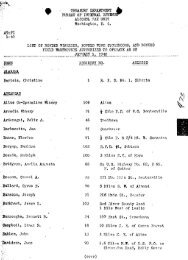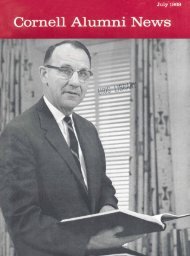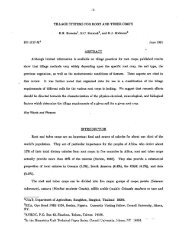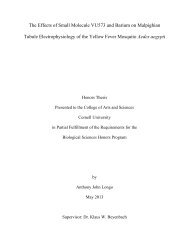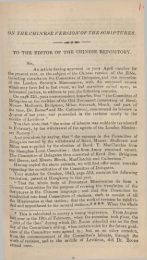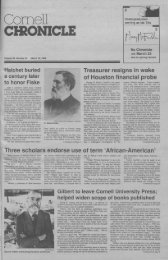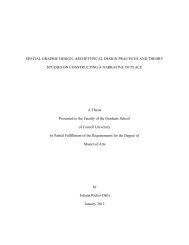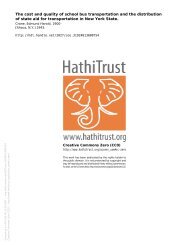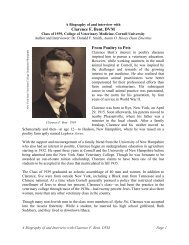University Awarded $1.25 Million Grant - ecommons@cornell ...
University Awarded $1.25 Million Grant - ecommons@cornell ...
University Awarded $1.25 Million Grant - ecommons@cornell ...
You also want an ePaper? Increase the reach of your titles
YUMPU automatically turns print PDFs into web optimized ePapers that Google loves.
y 11, 1972 CORNELLCHORNICLE 7<br />
Four Issues Raised by Protesters<br />
"formation gained at these meetings was passed on to the<br />
Omt Senate-Trustee Committee, and members were urged to<br />
tecome involved in the Institute meetings.<br />
tion on this year's proxies has recently been announced<br />
vote on the Gulf proxy was in favor of management on the<br />
>asis that the company has agreed to release information on its<br />
Wngola operation in June. In their letter to management the<br />
pustees ciricized Gulf on the delay in the release of this<br />
• mation. The proxies of Kennecott Copper Corporation. Ford<br />
^ Company. General Motors Corporation and International<br />
and Telegraph contained a long list of corporate<br />
ness items and social responsibility issues. In most cases,<br />
' Cornell voted to support management. Votes against<br />
1 Management were in two cases on issues involving ecology<br />
3 nd pollution, a third calling for disclosure of involvement in<br />
^hern Africa and a fourth concerning an orderly transition to<br />
lian oriented production.<br />
he opposing actions are a departure from past practices<br />
re Cornell, like most other institutions, has generally<br />
IJ<br />
pported management The Trustee position, while often in<br />
IJ<br />
Pport of socially responsible goals, has generally been that it<br />
more effective to express these views in a letter to<br />
^anagement than to cast an opposing proxy vote.<br />
Another evidence of change is the mid-April announcement<br />
at Yale <strong>University</strong> plans to shift "from an acquiescent to a<br />
anticipatory role as a major stockholder." Several other<br />
'Stitutions have this year announced votes against<br />
Management or abstention on social responsibility issues. It is<br />
' interest to note that both Oberlin College and the College<br />
!t<br />
-tirement Equity Fund (CREF) also voted against<br />
magement on some General Motors proxy items.<br />
At this point, it is hard to assess future voting issues, the<br />
lr<br />
end in vote casting, or the impact on corporate managers. For<br />
'hose having made the first step it is evident that sound<br />
lf<br />
eparatory measures to provide a rational forum for further<br />
scussion is needed.<br />
The last of the five spring meetings of the African American<br />
!1<br />
stnute will be held this month It will be led by Yale law<br />
'ofessor John G Simon who has recently co-authored a book<br />
n<br />
the exercise of corporate responsibility titled "The Ethical<br />
e<br />
Investor" and who has been involved in Yale's recently<br />
Enounced position. Cornell will be represented at that<br />
n<br />
Meeting I recently announced a May 25 meeting of the joint<br />
Senate-Trustee Committee and the full Investment Committee<br />
of tne Board This will be the initial meeting of the two<br />
Committees with the stated purpose of discussing the basic<br />
1<br />
'ssues and developing the criteria for social responsibility in<br />
e<br />
Cornell's ever-evolving investment policy.<br />
disenrollment procedures. The last of these conditions called<br />
for the establishment of a new committee on <strong>University</strong>-ROTC<br />
relations.<br />
In the fall of 1970. the Committee on <strong>University</strong>-ROTC<br />
Relationships, composed of six students, six faculty, two<br />
<strong>University</strong> administrators, and the three commanding officers<br />
of the ROTC units at Cornell, undertook a review of the ROTC<br />
program with special emphasis on the evaluation of the<br />
professional military courses which are not under the auspices<br />
of one of the degree-granting colleges or schools<br />
The <strong>University</strong> Senate was formed in the fall of 1970 and<br />
was constituted with the right to examine current policies on<br />
any activities of the <strong>University</strong> which have important social or<br />
political implications. This right includes making investigations,<br />
holding hearings and proposing both specific actions and<br />
general policies on such matters including military training.<br />
In the fall. 1970. a Senate Military Training Committee<br />
undertook a review of ROTC On December 10. 1970 the<br />
Senate approved a resolution recognizing "the prudence of<br />
maintaining a voluntary Commission-granting military<br />
education program on campus."<br />
In both the Faculty and Senate discussions, the delicate<br />
official information which has been designated as requiring<br />
protection in the interest of national defense), the manual<br />
notes that "The statement of President Edmund Ezra Day m<br />
1948 excluding classified research from the campus is still<br />
valid It was reaffirmed by the faculty in 1967. The ban on<br />
classified research extends specifically to those cases wheee<br />
there is a security classification or proprietary restriction placet,<br />
on the work " There have been no exceptions granted to this<br />
policy and there is no classified research on the Cornell<br />
campus.<br />
Some of the other important highlights of the research poligy<br />
as outlined in the manual are as follows:<br />
(1) "A faculty member is free to choose his research and<br />
submit proposals for support from outside the <strong>University</strong>,<br />
subject only to the policies and procedures set forth in this<br />
manual and to such restraints as may arise from the limited<br />
material resources of the <strong>University</strong> ' (Page G-1)<br />
(2) "The grant or contract should normally specify research in<br />
a broad field or an objective giving wide latitude in method drf<br />
approach." (Page G-1)<br />
(3) "The <strong>University</strong> will accept only those grants and<br />
contracts which are compatible with educational programs 61<br />
"There is little doubt that much of the research in the biological, physical and social<br />
sciences has potential military applications. The process of accumulating new knowledge<br />
may have an impact on any area of endeavor including the military. Even censorship of<br />
research proposals or projects would be ineffective in eliminating potential military<br />
applications of research findings. To eliminate research which might be potentially warrelated<br />
would mean the curtailment of most of the research effort of the Cornell faculty."<br />
MILITARY TRAINING AT CORNELL<br />
By w. D. Cooke, Vice President for Research; W. Keith<br />
Kennedy, Vice Provost; Robert J. Young, Chairman,<br />
J' Committee on <strong>University</strong>-ROTC Relationships<br />
The Land <strong>Grant</strong> Act of 1862 specified that federal funds from<br />
Dubhc lands or scrip would be used for the endowment support<br />
n announced. The vote on the Gulf proxy<br />
) that the company has agreed to release<br />
In their letter to management the Trustees<br />
e<br />
''this information. The proxies of Kennecott<br />
°\ny, General Motors Corporation and<br />
a long list of corporate business items<br />
Cornell voted to support management,<br />
issues involving ecology and pollution, a<br />
Sourthern Arica and a fourth concerning an<br />
d maintenance of at least one college in each state where,<br />
' ar<br />
nong other subjects, instruction would include military<br />
'<br />
'actics. Cornell <strong>University</strong>, the land grant college of the State of<br />
^ew York, met this military tactics requirement in a variety of<br />
^ays at its own expense until the establishment of the Reserve<br />
Officer Training Corps (ROTO program in 1916 From 1916<br />
Ur<br />
>til 1960. two years of ROTC were required of all male<br />
' s<br />
'udents. In 1960, upon recommendation of the faculty, the<br />
tr<br />
ustees made ROTC voluntary at Cornell<br />
During the latter part of the 1960's; faculty discussions on<br />
tri<br />
e status of the ROTC program culminated with the passage of<br />
'he Ratner (David L , professor of law) Committee Resolution in<br />
^969 This resolution read "Resolved that it is the sense of this<br />
*. ^acuity that military instruction should continue at Cornell<br />
°nder eight conditions." These conditions appeared in the<br />
November 13, 1969 issue of the Cornell Chronicle The first six<br />
Conditions dealt with academic matters, and the seventh with<br />
The ROTC staff has responded in a positive manner to the<br />
Faculty recommendations with the result that there has been a<br />
significant increase in civilian-taught electives in the program<br />
and a reduction in military-taught courses. The latter are under<br />
continual review of the <strong>University</strong>-ROTC Relationships<br />
Committee<br />
The basic reason for the maintenance of ROTC programs on<br />
university campuses is to provide civilian-trained men for the<br />
military forces, as well as providing another career choice for<br />
students. In addition, scholarship opportunities are available to<br />
those who desire to participate in the program and currently<br />
there are 175 students receiving about $620,000 in<br />
scholarship and subsistence funds.<br />
In recent years, the question of ROTC has been before the<br />
Faculty a number of times; it has been considered by the<br />
Senate; students have been polled and questionnaires have<br />
been sent to ROTC cadets and ROTC graduates. All of these<br />
groups have consistently maintained that ROTC should not be<br />
discontinued. On no other issue has there been so much<br />
widespread, sustained community input on a decision.<br />
SPONSORED RESEARCH<br />
By W. D. Cooke, Vice President for Research, and Thomas<br />
R. Rogers, Director, Academic Funding.<br />
The <strong>University</strong> policy on sponsored research is available in<br />
the "Manual of Policies and Procedures for Sponsored<br />
Projects" which is widely available in mail<br />
department and the dean's offices and at the Office of<br />
Academic Funding.<br />
As to classified research (The term "classified" refers to<br />
years by DOD are now supported by NSF President Corson ha;<br />
tried since 1965 to encourage government agencies to move rv<br />
this direction<br />
In 1969, as a matter of policy. Cornell <strong>University</strong> refused t.<br />
comply with a DOD request for an evaluation of the militaT<br />
implications of the research being supported at Cornell by fl<br />
agencies. As a consequence these evaluations wen<br />
independently prepared by DOD generally without the aidx<br />
knowledge of the principal investigator Similar statement<br />
could be prepared for most of the research effort of the Cornell<br />
faculty.<br />
There is little doubt that much of the research in th<<br />
biological, physical and social sciences has potential militar<br />
applications The process of accumulating new knowledge ma\<br />
have an impact on any area of endeavor including the military<br />
Even censorship of research proposals or projects would bt<br />
ineffective in eliminating potential military applications o<br />
research findings. To eliminate research which might bt<br />
potentially war-related would mean the curtailment of most o'<br />
the research effort of the Cornell faculty<br />
The Office of Academic Funding has given assurance that tc<br />
the best of their knowledge: All research contracts currently<br />
being funded by DOD would be eligible for support by NSF, ii<br />
funds were available; there are no DOD contracts that do not<br />
have a broad scientific basis and that would not go beyond:e<br />
specific military or industrial problem; and there are nc<br />
contracts involving counter-insurgency.<br />
Information on all contracts and grants has always beer<br />
available to any rhember of the Cornell community from th€<br />
Office of Academic Funding.



